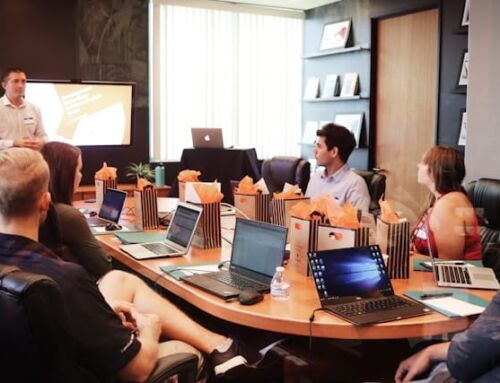Gone are the days when human resources just meant hiring and paperwork. Today’s people teams are expected to understand business goals, help shape company culture, and support growth—all while keeping everything organized and compliant. It’s a lot, but it’s also what makes the role so rewarding.
And let’s be honest—business moves fast. Between shifting workplace trends, new technologies, and changing employee expectations, professionals in this field need to stay sharp. If you’re looking to stay relevant and move up the ladder, you’ll need more than just people skills. Let’s break down the things that really matter.
Image by Tima Miroshnichenko on Pexels
A Strong Understanding of Business Fundamentals
You need to know how the business runs to truly make an impact. Understanding budgeting, revenue models, and how departments connect helps you offer smarter, more relevant support. It also builds your confidence in cross-functional discussions. When you know the basics of business strategy, you’re better equipped to align your role with leadership goals. This makes your work more strategic and less reactive. The more business-savvy you are, the more influence you’ll have when decisions are being made.
A Targeted Education
Some roles don’t require formal education in business. But a solid academic background can make a huge difference if you’re looking to lead teams, manage big projects, or influence company direction. That’s where programs like online MBA with HR concentration offered by William Paterson University come in. This program gives you a mix of business management, leadership, and people strategy. You’ll cover labor law, talent development, organizational behavior, and more—all through a flexible, remote-friendly format.
The university also offers a range of online degrees in fields like nursing, public health, and computer science, making it a strong choice for anyone seeking practical, career-ready education backed by a supportive learning environment.
Data Fluency and Analytics Skills
You don’t need to be a data scientist, but you should know how to read and use key metrics. Employee turnover, engagement scores, and training results help you make better decisions. Numbers tell a story. You just have to know how to read it. Learning to spot trends or identify gaps with data can help you present solid cases for change. Whether it’s pitching new software or adjusting hiring plans, showing the numbers gives your ideas more weight and credibility.
Change Management and Adaptability
Companies change all the time. New tools, new goals, even full restructures. Your role is to help teams adjust without losing momentum. Being flexible, supportive, and organized during change keeps things running as smoothly as possible. Having experience with change processes—like office moves, mergers, or policy shifts—prepares you for future transitions. It also helps you guide others through uncertainty, which is a major skill in today’s evolving workplaces.
Technology Savvy and Digital HR Tools
Everything from payroll to performance reviews now runs through software. Being familiar with digital tools makes your job easier and keeps your team efficient. It also saves time, reduces manual work, and helps with accuracy. Whether it’s an HRIS platform, a recruiting app, or performance tracking software, knowing your way around these tools makes you more effective. Now’s a good time to start learning if you’re not already exploring them.
Leadership and Decision-Making Confidence
Modern professionals in this field aren’t just managing policies—they’re shaping culture, guiding teams, and helping organizations grow. That means being able to lead with clarity and confidence, especially in high-pressure situations. Strong leadership comes from experience, but it also comes from understanding your organization’s bigger picture. Knowing how to weigh pros and cons, make timely decisions, and communicate them effectively will help you stand out and build trust across departments.
Legal and Ethical Expertise
Staying on top of workplace laws isn’t optional—it’s essential. There are rules to follow from hiring practices to employee rights, and missing a step can lead to costly problems. The more you know, the better you can protect your team and your company. But it’s not just about rules. Ethical decision-making is just as important. Fairness, transparency, and respect all matter. By doing what’s right—even when it’s not easy—you create a better environment for everyone.
A Strategic Mindset, Not Just Operational Skills
There’s a big difference between completing tasks and driving impact. Being strategic means thinking ahead, understanding business goals, and planning your work to support those goals. It’s about being proactive instead of reactive. You can start by asking smarter questions: What does the company want to achieve this year? How can people strategies support that? When your work is tied to results, your value becomes clear to leadership.
A Focus on Employee Experience and Culture
Happy teams do better work—it’s as simple as that. So much of your role comes down to helping people feel supported, respected, and motivated. That’s where a strong workplace culture makes all the difference. Whether it’s improving feedback systems or offering more flexibility, small changes can have a big impact. Listening to your team and acting on their input helps build a place where people actually want to stay and grow.
You need more than good instincts to succeed in today’s people-focused roles. You need business knowledge, tech familiarity, strategic thinking, and a real commitment to growth. Each of these areas helps you stay sharp, relevant, and ready to take the lead.







Leave A Comment